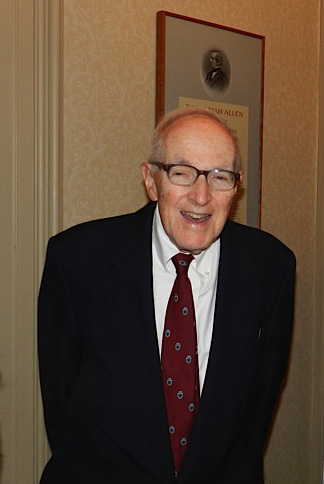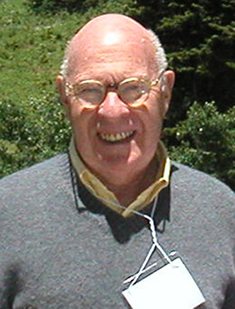In Memoriam
In Memoriam
8/29/1927 - 5/2/2014
George S. and Nancy B. Parker, Professor Emeritus of Economics
It is with profound sadness that I inform you of the passing of Professor George H. Borts on Friday May 2, 2014.
 Professor Borts was the George S. and Nancy B. Parker Professor Emeritus of Economics, having retired from the University in July 2013. He received an A.B. in economics and history from Columbia University in 1947, and a PhD in economics from the University of Chicago in 1953.
Professor Borts was the George S. and Nancy B. Parker Professor Emeritus of Economics, having retired from the University in July 2013. He received an A.B. in economics and history from Columbia University in 1947, and a PhD in economics from the University of Chicago in 1953.
He first came to the University as an Assistant Professor in 1950, when he was only twenty-two years old. He went on to have a long and distinguished career at Brown. Climbing through the ranks, he was promoted to Associate Professor in 1954, and to Professor in 1960, serving as Chair of the Department of Economics between 1964 and 1967. His 63 years of service as a faculty member is virtually unparalleled, not only at Brown, but anywhere else.
As an economist, he made contributions to the fields of transportation economics, industrial organization, and international finance. His distinguished academic career includes eleven years, between 1969 and 1980, as the Managing Editor of the American Economic Review, one of the top academic journals of the profession.
His legacy as an economist includes not only dozens of scholarly papers, but the many lives he touched as a cherished colleague, teacher, and advisor. Over more than six decades at Brown, George Borts had thousands of students, and supervised dozens of senior theses and doctoral dissertations. Until last year, he was teaching undergraduate courses on international finance and on the welfare state in America, as well as leading several independent studies on a variety of topics. In order to honor George, the Department of Economics, with the help of an anonymous donor, has endowed the George Borts Economics Dissertation Prize, to recognize the best economics doctoral dissertation written each year. At his retirement dinner hosted by the Department of Economics last September, many of his former graduate students came back to Brown to show their gratitude and affection to George and shared with all of us their great memories of his teaching and advising.
George Borts was unanimously admired by his colleagues and students, who will always remember and miss his insight, humor, and kindness.
Donations to the George Borts Dissertation Fund will be gratefully accepted. If you would like to contribute, please send a check made payable to Brown University to the following address: Department of Economics, Brown University, Box B, Providence, RI, 02912. Please indicate that it is for Borts Dissertation Fund in the check memo line.
BDH article "Students and friends remember former economics prof. for humor and brilliance"
7/11/1938 - 12/15/2019
Professor of Economics
Memorial for Harl Ryder, Professor Emeritus
Harl Edgar Ryder was born in 1938 in Mr. Vernon, Illinois. After earning a BA and MS from the University of Illinois, he received his Ph.D. in Economics from Stanford University. His career at Brown University spanned the four decades from 1965 to 2005, and he was Chairman of the Economics Department from 1974 to 1981. He was Associate Chair for the graduate program in Economics from 1982 – 1989, held several positions on university committees, and was visiting professor at the University of Bonn during 1981 – 82 and at the Autonomous University of Barcelona in 1989 – 1990.
Ryder’s expertise lay in mathematical economics, which he taught at both undergraduate and graduate levels. He authored or co-authored several papers appearing in the top general interest journals of the economics discipline, including Journal of Political Economy, Quarterly Journal of Economics and Econometrica. Possibly his most influential papers is Ryder and (Geoffrey) Heal, “Optimal Growth with Intertemporally Dependent Preferences,” which appeared in the Review of Economic Studies in 1973. His papers also appeared in top field journals including Journal of Economic Theory and Journal of Mathematical Economics.
Colleagues and former colleagues remember with appreciation Ryder’s generosity in offering his time to help them address the mathematical issues arising in their varied research projects. Some evidence appears in the form of as many as seven papers Ryder co-authored with colleagues including the late Martin Beckmann and Herschel Grossman, current faculty members Oded Galor and David Weil, and former department members Gil Skillman and Francis Bloch. But for each such listed paper, there are many others of former Ph.D. students and colleagues on which his suggestions played an important part; he was known as “the go to person” in the department for problems of mathematical modeling. Galor described Ryder as “unique, in the academic world, for his kindness and generosity” and said that “his approach to mathematical problems was impressive and had few parallels.”
Generations of Brown faculty, grad students, and their children will remember Harl in his cameo role of Santa Claus. At the high point of our departmental Christmas parties, Santa/Harl would dash around Robinson Hall’s rotunda balconies and bound down the metal stairway in full red and white regalia, booming out “ho, ho, ho” in a deep baritone voice made to order for the building’s acoustics. Arriving on the crowded ground floor, he’d seat himself on a chair by the well-decorated tree, call each child of our faculty and graduate students’ up for his or her turn on his lap, and watch them open their presents with the same delighted smile on his face as when he had solved a math problem.
3/6/1939 - 10/9/2004
Professor of Economics
Herschel Grossman, professor of economics at Brown University, died suddenly on October 9, 2004 in Marseilles, France, where he was attending an academic conference. He was 65 years old. The cause of death was not immediately known.
Grossman grew up in Philadelphia, where he attended Central High School. After receiving his B.A. from the University of Virginia, B. Phil from Oxford, and Ph.D. from Johns Hopkins University, Grossman joined Brown’s faculty in 1964. He was appointed Merton P. Stultz Professor in the Social Sciences in 1980, and served as department chair from 1982-1985 and 1986-1991.
Much of Grossman’s early academic work was in the area of Keynesian macroeconomics, specifically an attempt to understand the process through which monetary policy, as carried out by central banks like the Federal Reserve, affects such economic variables as unemployment and the level of output. His model of “disequilibrium macroeconomics,” developed jointly with Robert Barro provided a rigorous analytic foundation for understanding how the failure of prices and wages to adjust in a manner that equalized supply and demand could lead to diverse phenomena such as unemployment, inflation, and the shortages of goods that plagued socialist economies. The work, summarized in their 1976 book Money, Employment, and Inflation (Cambidge University Press) was widely influential on a generation of economists.
In subsequent work, Grossman turned away from the question of why particular policies affect the economy to ask how policy makers decide what policies to follow. One of his most fruitful observations was that the degree to which a policy maker is willing to make short-run sacrifices in order to reap long-run benefits depends on how long the policy maker expects to remain in power. This observation led him to begin studying what determined how long rulers – either individual strong-men or ruling elites – are able to stay in power.
In his most recent research, Grossman had been studying “appropriative conflict,” that is, struggles between individuals or groups over the definition of property rights. Such conflict, he pointed out, has always been as much a part of economic interaction as the buying and selling in markets that economists traditionally study. Grossman’s analyses in this area extended to cover conflicts between states, between governments and insurgents, and between thieves and property-owners, as well as such non-traditional economic activities as banditry, extortion, and kidnapping.
Grossman was a Guggenheim Fellow and a Visiting Scholar at the Russell Sage Foundation. He served on the editorial boards of several journals, including the American Economic Review, The Journal of Monetary Economics, The European Journal of Political Economy, and Economics of Governance, and was a Research Associate of the National Bureau of Economic Research. At Brown he was the academic liaison for the football team and also participated in the recruiting of student athletes. His interests included gardening and art and architecture.
He is survived by his beloved wife, Suzanne, daughter Rebecca Gruber, Arlington, MA son, Andrew Grossman, Seekonk, MA, and grandson Samuel M. Thomas Gruber. He will be missed dearly by Donna Goldman, Gary Goldman and Nancy Friedman, his wife’s children and her four grandchildren.
In lieu of flowers, please send donations to the Herschel Grossman Fund, Brown University Dept. of Economics, Providence, RI 02912 to support graduate students and lectures in Grossman’s areas of interest, or to the Herschel Grossman Fund, The Rhode Island Foundation, 1 Union Station, Providence, RI 02903.
11/14/1928 - 2/7/2013
Professor Emeritus of Economics, Eastman Professor of Political Economy, Visiting Professor (Research), Division of Applied Mathematics
It is with sadness and regret that we inform you of the passing of Emeritus Professor Jerome Stein on Thursday, February 7, 2013.
 Professor Stein was born in New York City on November 14, 1928, and educated at Brooklyn College. He received his Ph.D. from Yale University in 1955 and Docteur Honoris Causa from the Universite de la Mediterranee, Aix-Marseille II in 1997. His entire academic career was spent at Brown, where he joined the Department of Economics in 1953. Although he formally retired as Eastman Professor of Economics in 1993 he continued scholarly work in the Division of Applied Mathematics. In a long and distinguished career, he served on editorial boards of several prestigious economics journals, published over a dozen books and authored over a hundred scholarly articles. His research made significant contributions across diverse fields including monetary and fiscal policy, economic growth, applications of stochastic optimal control to international finance and debt crises, and policies for natural hazard mitigation.
Professor Stein was born in New York City on November 14, 1928, and educated at Brooklyn College. He received his Ph.D. from Yale University in 1955 and Docteur Honoris Causa from the Universite de la Mediterranee, Aix-Marseille II in 1997. His entire academic career was spent at Brown, where he joined the Department of Economics in 1953. Although he formally retired as Eastman Professor of Economics in 1993 he continued scholarly work in the Division of Applied Mathematics. In a long and distinguished career, he served on editorial boards of several prestigious economics journals, published over a dozen books and authored over a hundred scholarly articles. His research made significant contributions across diverse fields including monetary and fiscal policy, economic growth, applications of stochastic optimal control to international finance and debt crises, and policies for natural hazard mitigation.
In the last year of his life he completed and published an important monograph "Stochastic Optimal Control and the U.S. Financial Debt Crisis" (Springer 2012) and finished the manuscript of an interdisciplinary study "Playing Against Nature: integrating geoscience and economics in natural hazard mitigation" described in a recent article in the Brown Daily Herald, in the American Geophysical Union and also in the Society for Industrial and Applied Mathematics.
His colleagues and students will remember him as a committed scholar, an inspiring mentor and a trusted friend. An annual award is being set up in his memory to recognize an undergraduate for excellence in terdisciplinary applications of applied mathematics. Contributions can be sent to:
Prof. Björn Sandstede
Chair, Division of Applied Mathematics
Brown University
182 George Street
Providence, RI 02912, USA
Checks can be made payable to Brown University, with a note saying that it is in memory of Jerome Stein.
7/5/1924 - 4/11/2017
Professor Emeritus of Economics